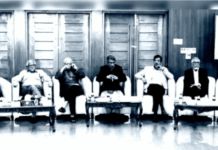
By Kamran Reza Chowdhury on Apr 27, 2023
Bangladesh agreed with Japan on Thursday that the Ukraine war violated international law and the United Nations charter, a move showing Dhaka is retreating from its position of uncritical observer, analysts said.
The South Asian nation’s latest position was reflected in a joint statement with Japan issued during Bangladesh Prime Minister Sheikh Hasina’s visit to Tokyo.
“The two prime ministers affirmed that the war in Ukraine constitutes a violation of international law, in particular of the U.N. Charter, and is a serious threat to the international order based on the rule of law, with ramifications well beyond Europe, including in the Indo-Pacific,” the statement said.
“They reiterated the call for a peace process through dialogue and diplomacy with respect for the sovereignty and territorial integrity of Ukraine within its internationally recognized borders and in accordance with the principles of the U.N. Charter.”
But as recently as February, Bangladesh abstained from voting on a U.N. General Assembly resolution, which, among other things, called on Russia to withdraw all its troops from Ukraine. At the time, the Russian embassy in Dhaka thanked Bangladesh for abstaining from the vote.
Bangladesh also abstained during voting on a similar resolution in March 2022. Back then local media reported that PM Hasina told parliament that Russia, as the Soviet Union, had supported Bangladesh when it was fighting for independence in 1971.
According to bdnews24.com, she also said that “wars do not break out on their own – there must be some instigation or incitement.”
“Why would we simply denounce a country? That was why we refrained from voting,” Hasina reportedly told parliament.
“When the U.S. supported Pakistan [in 1971] by sending its Seventh Fleet, it was Russia who stood beside us. Therefore, we must help those who helped us during our dire need.”
While on a visit to Kyiv last month, Japanese PM Fumio Kishida, unlike Bangladesh or Asian superpower China, reaffirmed his country’s solidarity with Ukraine.
During her four-day trip to Tokyo, Hasina hopes to build defense cooperation with Japan, even as Tokyo looks to expand regional partnerships to counter Beijing’s influence in Asia.
The joint statement said that Kishida “explained the situation” in the East and South China seas to Hasina.
Tokyo has territorial disputes with Beijing over the Senkaku Islands in the East China Sea, while several Southeast Asian nations have overlapping claims with China’s in South China Sea.
“The two Prime Ministers expressed their commitment to fully observing the 1982 United Nations Convention on the Law of the Sea (UNCLOS) and reiterated that any unilateral attempts to change the status quo by force or coercion and increase tensions that could undermine regional stability and the rules-based international order are unacceptable,” the joint statement said.
Japan is the architect of the Free and Open Indo-Pacific concept and Bangladesh this week for the first time released its own Indo-Pacific outlook.
Bangladesh’s outlook also sees all United Nations treaties and international conventions, as they are applicable, guiding its strategy. These include the 1982 UNCLOS, but its joint statement with Japan uses stronger language about coercion.
Entering new territory
Diplomatic observers noted that the joint statement appeared to show that Dhaka was changing direction in its foreign policy.
“[W]e are entering a new territory of foreign relations,” Humayun Kabir, a former Bangladesh envoy to the U.S., told BenarNews.
“Now we see a careful change of Bangladesh’s position on the Ukraine war in the joint statement. … As Bangladesh wants to woo Japanese investment and improve bilateral relations, she needs to align with Japanese positions to the maximum extent.”
Another analyst, Imtiaz Ahmed, from Dhaka University, said Bangladesh for the first time had altered its position on the Ukraine war, and it was worth noting that the joint statement did not name Russia as the aggressor.
“Here Bangladesh has been able to soften Japan’s hard line against Russia,” Ahmed, an international relations expert, told BenarNews.
“Maybe Bangladesh can no longer overlook the issue of the Ukraine war. That’s because the war has disrupted the global supply chain. Economically, Bangladesh has been seriously affected.”
Both Kabir and Ahmed noted that the joint statement’s mention of the east and South China seas was also a departure for Dhaka.
“Bangladesh usually does not comment on the situation in the East and South China seas. For the first time Bangladesh has taken a position on this issue. This position is actually Japan’s,” Kabir said.
Ahmed noted that in this instance, too, the statement did not mention China by name.
Bangladesh is caught in the middle of a geopolitical battle between China and the U.S., as well as their respective allies, as they vie for supremacy in the region, analysts have said.
And Beijing and Washington are seeking influence in the non-aligned South Asian nation. But Bangladesh needs both nations for its economic development and has to balance its relationships with them.
For instance, when the war in Ukraine broke out, PM Hasina said in March last year Bangladesh would carry on work on its first nuclear energy plant being built by Russia and would not stop doing business with Moscow.
But by December that year Bangladesh had to change its tune.
Bangladesh blocked a Russian ship from entering a local port just before Christmas due to U.S. sanctions on the vessel linked to Moscow’s war in Ukraine. Then in January, Bangladesh banned the entry of nearly 70 U.S.-sanctioned Russian ships.
Russia was not happy, and a month later summoned Bangladesh’s envoy to Moscow and said the ban did not bode well for the cooperation between the two nations.
As Kabir noted: “This [latest foreign policy] change may send an uncomfortable message to China and Russia.”









